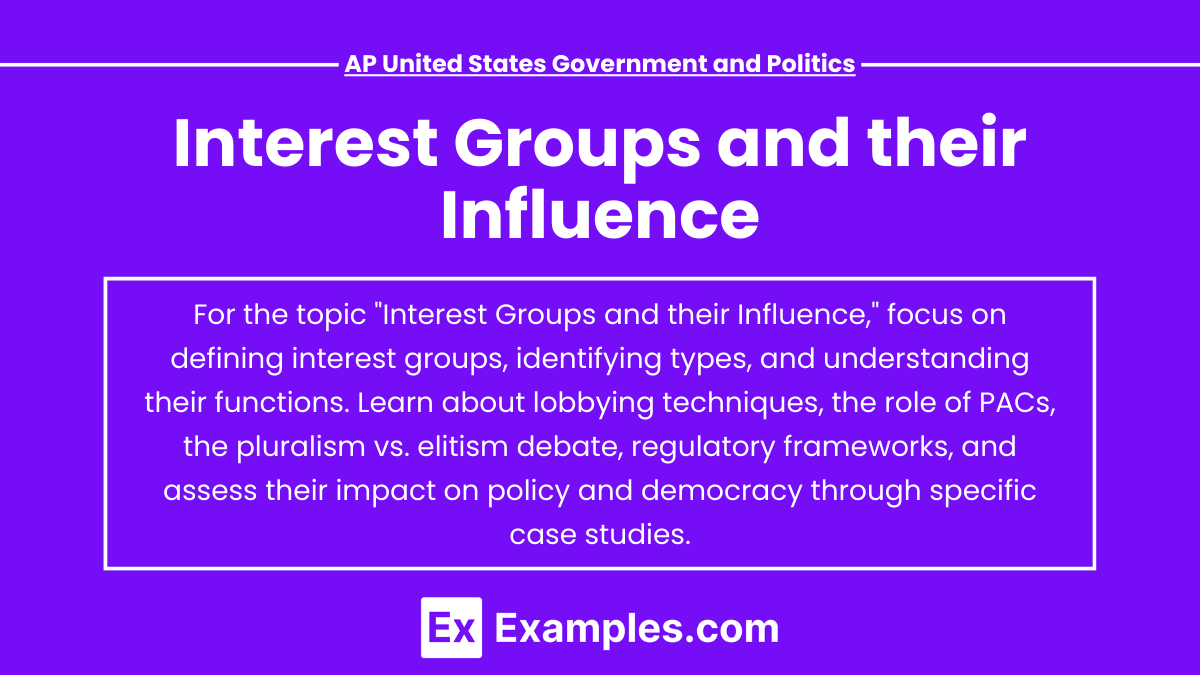Interest groups play a vital role in the American political landscape by advocating for specific causes and influencing public policy. These organizations represent a diverse range of interests, from economic and environmental issues to civil rights and healthcare. By employing various strategies such as lobbying, grassroots mobilization, and campaign contributions, interest groups seek to sway lawmakers and shape legislation. Understanding their influence is essential for grasping how policy decisions are made and the broader implications for democracy in the United States.
Free AP United States Government and Politics Practice Test
Learning Objectives
In studying "Interest Groups and their Influence" for the AP United States Government and Politics exam, you should aim to define what interest groups are and distinguish them from political parties and other organizations. Familiarize yourself with the various types of interest groups, such as economic, ideological, public interest, and single-issue groups. Understand the key functions they serve in the political process, including representation, education, lobbying, and mobilization. Evaluate how these groups influence public policy through methods like direct lobbying, campaign contributions, and grassroots efforts. Examine the role of Political Action Committees (PACs) in funding campaigns and their effects on electoral outcomes.
The Role of Interest Groups
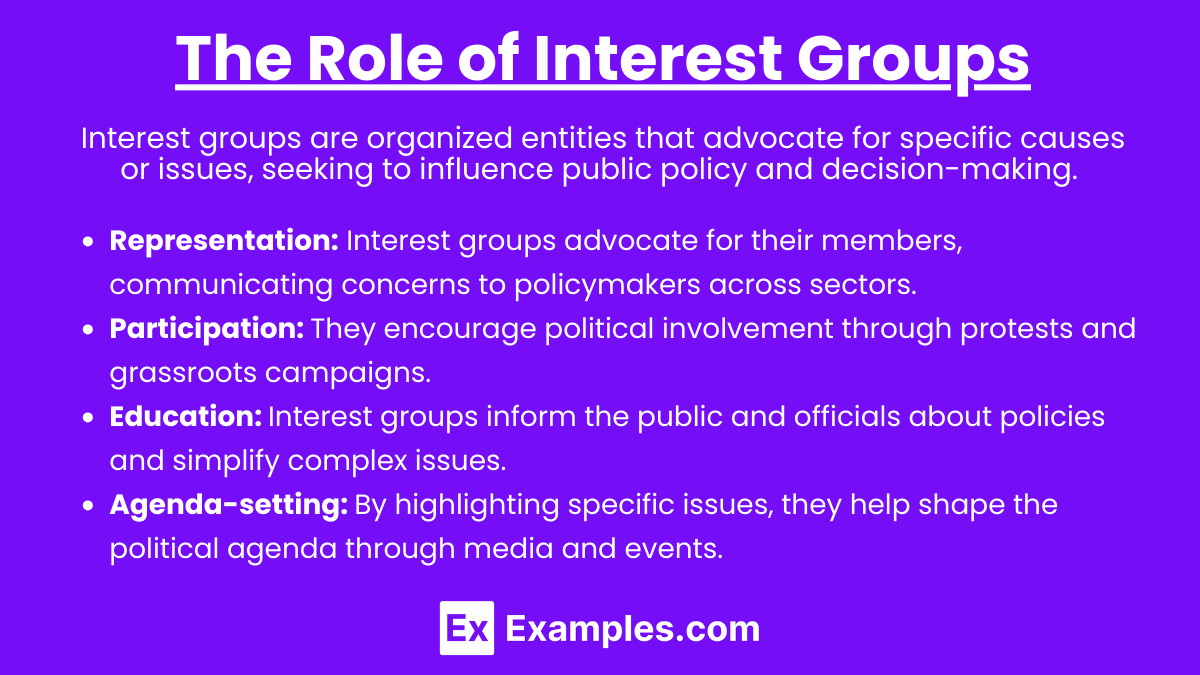
Interest groups function as intermediaries between the public and policymakers. They represent the interests of their members or broader constituencies and lobby government officials to adopt policies that favor their cause. These groups may advocate for various issues, including economic, environmental, social, or ideological concerns. Some key roles they play include:
Representation: Interest groups act as voices for their members, articulating concerns to policymakers. They represent diverse sectors such as business, labor, education, healthcare, and civil rights.
Participation: They encourage political participation by organizing protests, petitions, and grassroots campaigns, allowing citizens to engage in politics beyond just voting.
Education: Interest groups provide information and expertise to both the public and government officials. They inform policymakers about the potential impact of policies and legislation, often framing complex issues in simpler terms.
Agenda-setting: By focusing attention on specific issues, interest groups help shape the political agenda. They may use media campaigns or public events to draw attention to key issues that otherwise might be ignored.
Types of Interest Groups
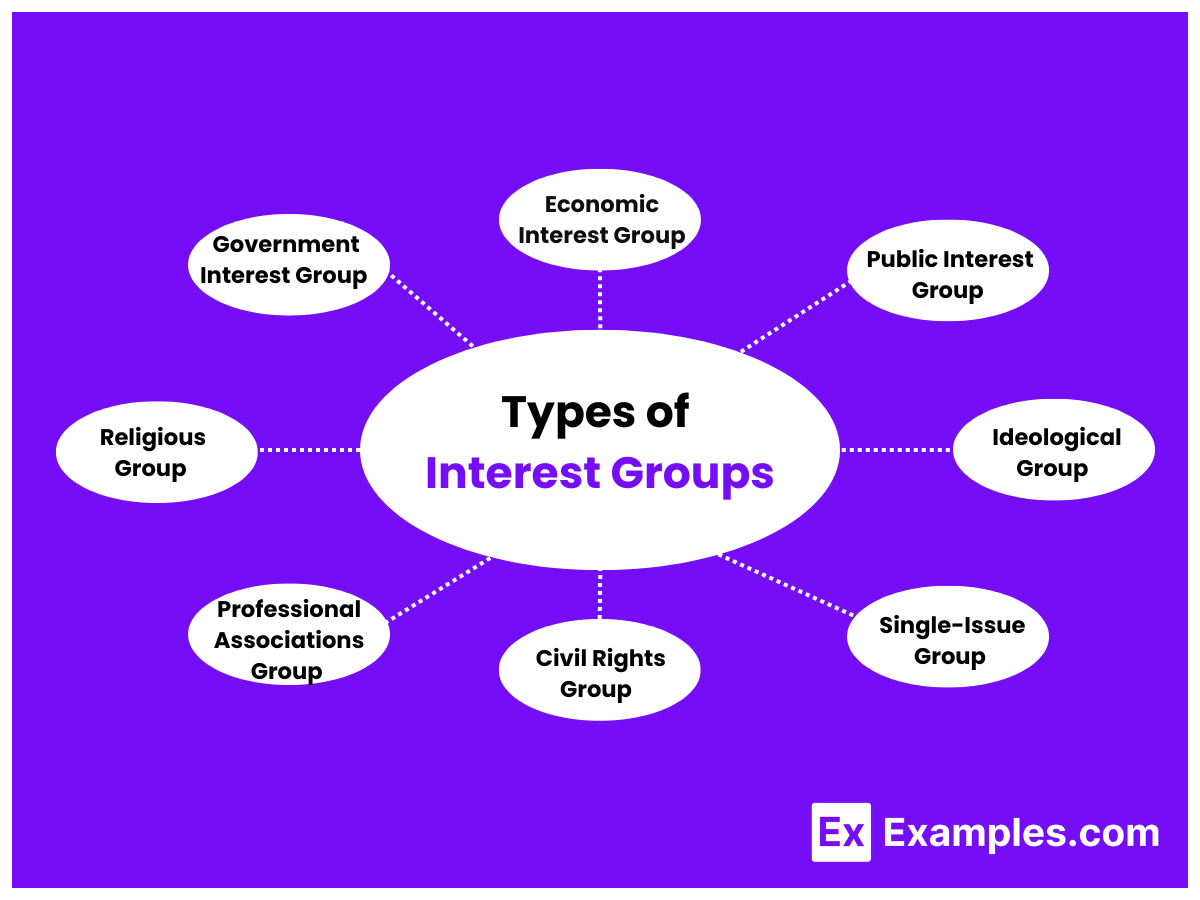
Interest groups come in different forms, each with distinct goals and methods:
Economic Interest Groups: Focus on promoting the financial interests of their members, including businesses, labor unions, and trade associations.
Public Interest Groups: Advocate for issues that benefit the public, such as environmental protection, consumer rights, and public health.
Ideological Groups: Promote specific ideological beliefs or agendas, often tied to political or social philosophies, like liberalism or conservatism.
Single-Issue Groups: Concentrate on one specific area, such as gun rights, abortion, or immigration reform, aiming to influence policy on that issue.
Civil Rights Groups: Work to protect and advance the rights of specific groups, such as racial minorities, women, and the LGBTQ+ community.
Professional Associations: Represent the interests of professionals in specific fields, such as the American Medical Association (AMA) or the Bar Association.
Religious Groups: Advocate for policies aligned with their religious beliefs, influencing issues like education, marriage, and social justice.
Government Interest Groups: Represent the interests of state or local governments, focusing on issues like federal funding and policy impacts on governmental operations.
Strategies Used by Interest Groups
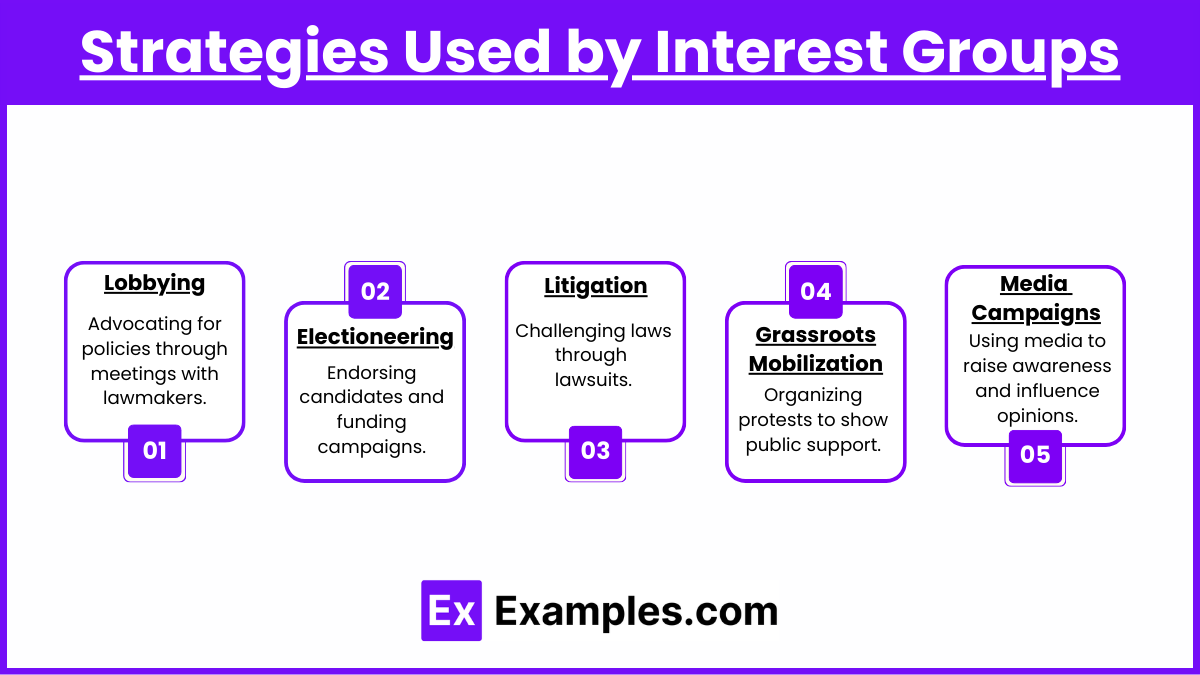
Interest groups employ various tactics to achieve their objectives, including:
Lobbying: This is one of the most common methods. Lobbyists meet with legislators, government officials, and their staff to persuade them to support or oppose particular policies. They may provide research, draft legislation, or testify before congressional committees.
Electioneering: Interest groups often endorse candidates who support their views, contribute money through Political Action Committees (PACs), and run advertisements during election campaigns to influence the outcome.
Litigation: Some interest groups use the courts to influence policy. They may file lawsuits to challenge laws or regulations they oppose or submit amicus curiae briefs to provide additional perspectives in legal cases.
Grassroots Mobilization: Interest groups engage the public directly by organizing protests, rallies, or letter-writing campaigns. These actions put pressure on lawmakers by showing that many citizens support a particular cause.
Media Campaigns: They use media—television, radio, newspapers, and social media—to raise awareness and shape public opinion on key issues. This can increase support for their cause and pressure politicians to act accordingly.
Influence of Interest Groups on Policy
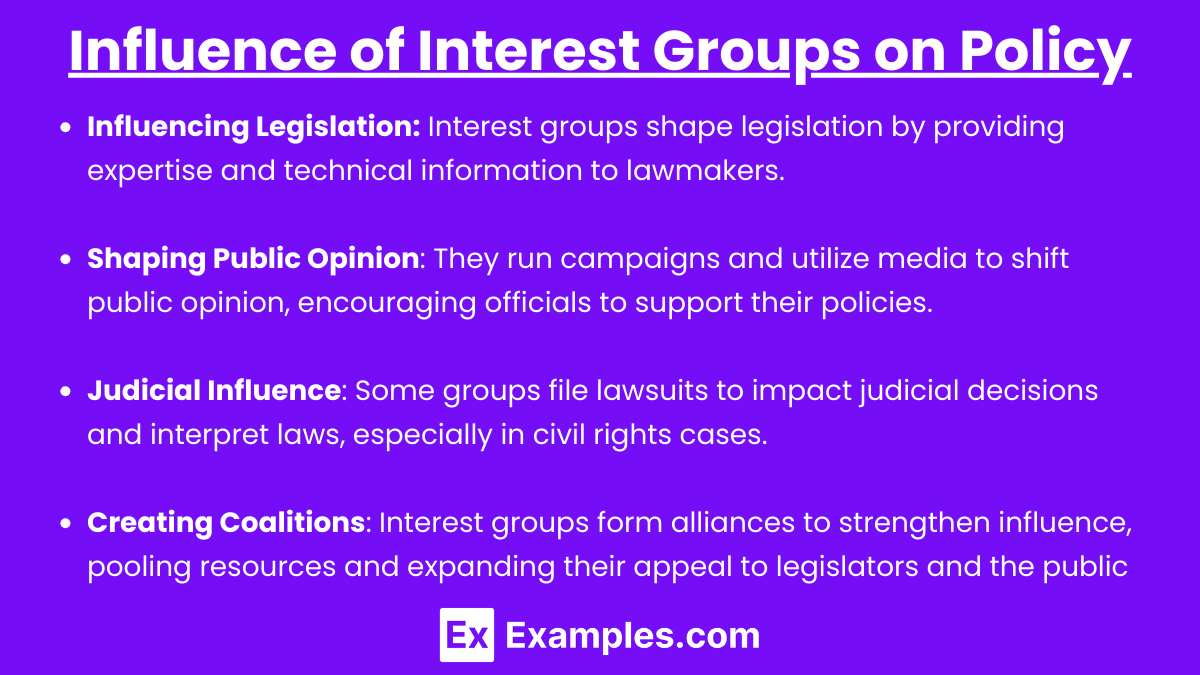
Interest groups significantly impact public policy. Their influence can be seen in various ways:
Influencing Legislation: Through lobbying, interest groups often shape the wording and content of legislation. They provide lawmakers with expertise and technical information, helping them craft policies that align with the group's interests.
Shaping Public Opinion: By running campaigns, releasing studies, and using the media, interest groups often play a role in shifting public opinion. When public opinion shifts, elected officials may be more likely to support policies that align with the interests of these groups.
Judicial Influence: Some interest groups focus on influencing judicial decisions. By filing lawsuits or supporting legal challenges, they can shape how laws are interpreted by the courts. For example, civil rights groups have used the courts to advance issues like voting rights and equal protection under the law.
Creating Coalitions: Interest groups often form alliances with other groups to strengthen their influence. These coalitions can pool resources, share expertise, and broaden their appeal to more legislators or members of the public.
Criticisms of Interest Groups
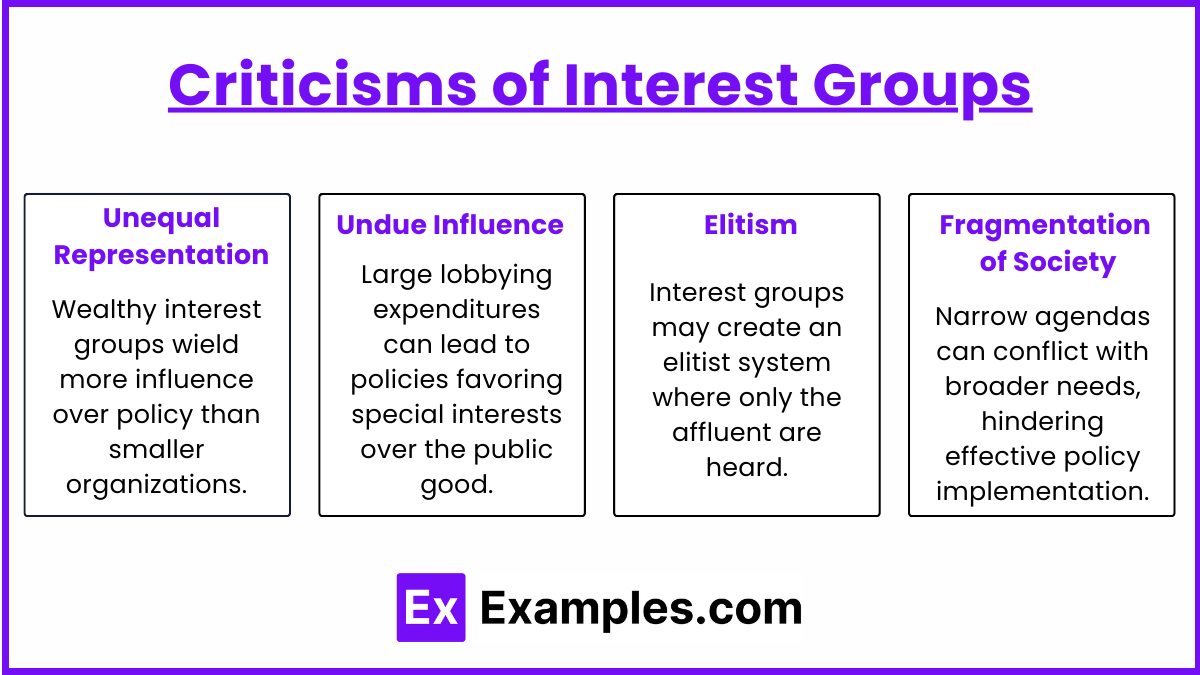
While interest groups play an important role in American democracy, they also face criticism for several reasons:
Unequal Representation: Not all interest groups have the same resources. Wealthier groups with more financial backing, like corporate interests, tend to have greater influence over public policy than smaller or less well-funded groups.
Undue Influence: Critics argue that interest groups may have too much influence, especially when they spend large sums of money on lobbying and campaign contributions. This can lead to policies that favor special interests rather than the public good.
Elitism: Some argue that interest groups contribute to an elitist system in which only those with access to money and power have their voices heard in the political process.
Fragmentation of Society: Interest groups sometimes promote narrow interests that may conflict with broader societal needs. This can create division and make it harder for lawmakers to enact policies that benefit the common good.
Examples
Example 1 : National Rifle Association (NRA)
The NRA is one of the most powerful single-issue interest groups in the United States. Focused on protecting the Second Amendment right to bear arms, the NRA uses lobbying, electioneering, and grassroots mobilization to influence gun legislation. It has successfully opposed gun control measures and promoted legislation that expands gun rights. Through significant financial contributions to political candidates and media campaigns, the NRA influences both public opinion and lawmakers, ensuring that gun-friendly policies remain prominent in many states.
Example 2 : American Civil Liberties Union (ACLU)
The ACLU is a public interest group focused on defending individual rights and liberties, such as freedom of speech, privacy, and equal protection under the law. The ACLU frequently uses litigation to challenge unconstitutional laws and government actions. For example, it played a major role in court cases related to civil rights, reproductive rights, and privacy issues. By filing lawsuits and amicus briefs, the ACLU has influenced landmark Supreme Court decisions, including those related to freedom of speech and due process protections.
Example 3 : American Association of Retired Persons (AARP)
AARP is a powerful economic interest group that advocates for the rights and interests of Americans aged 50 and older. The organization has a strong lobbying presence in Washington, D.C., where it influences policy on healthcare, Social Security, and retirement benefits. AARP played a critical role in protecting Medicare during various reform debates and has been influential in shaping policies to expand healthcare access for seniors. Its large membership and lobbying efforts give it significant political clout.
Example 4 : Sierra Club
The Sierra Club is an environmental interest group dedicated to protecting the environment and promoting sustainability. Through lobbying, public campaigns, and litigation, the Sierra Club has influenced U.S. environmental policy. It has been active in advocating for legislation aimed at reducing carbon emissions, protecting natural habitats, and promoting renewable energy. The organization has had considerable success in shaping environmental regulations, opposing the construction of harmful infrastructure, and promoting cleaner energy initiatives.
Example 5 : Chamber of Commerce
The U.S. Chamber of Commerce is a major business interest group representing the interests of businesses of all sizes. It advocates for policies that promote economic growth, deregulation, and lower taxes. Through extensive lobbying and campaign contributions, the Chamber of Commerce influences trade policies, labor laws, and regulations that affect businesses. For example, it played a significant role in opposing increases in corporate taxes and supporting pro-business legislation, such as tax cuts and deregulation efforts. Its influence is felt in both Congress and state legislatures, where it consistently pushes for policies favorable to the business community.
Multiple Choice Questions
Question 1
Which of the following is the primary goal of an interest group?
A) Winning elections to hold political office
B) Influencing public policy and government decisions
C) Overseeing the judicial system
D) Conducting international diplomacy
Answer: B) Influencing public policy and government decisions
Explanation: The primary function of an interest group is to influence public policy and government decisions, not to run candidates for office. Unlike political parties, which seek to win elections, interest groups focus on advocating for specific causes, such as environmental protection, civil rights, or economic regulations. They achieve their goals through lobbying, litigation, grassroots campaigns, and media outreach, all designed to sway the actions of policymakers in their favor.
Question 2
Which of the following strategies is most commonly used by interest groups to influence legislation?
A) Voter suppression
B) Litigation in the courts
C) Lobbying elected officials
D) Sponsoring public rallies
Answer: C) Lobbying elected officials
Explanation: Lobbying elected officials is one of the most common strategies used by interest groups to influence legislation. Lobbyists meet with legislators and government staff to provide information, propose legislation, or advocate for changes to existing laws. While interest groups may also use other strategies such as litigation or public demonstrations, lobbying is a direct way to shape the legislative process by interacting with policymakers and advocating for their preferred outcomes.
Question 3
Which of the following is a criticism often made against interest groups?
A) They help maintain transparency in government
B) They promote equal representation of all interests
C) They can lead to unequal influence over policy
D) They always work for the public good
Answer: C) They can lead to unequal influence over policy
Explanation: One of the major criticisms of interest groups is that they can lead to unequal influence over public policy. Well-funded groups, especially those representing wealthy corporations or industries, often have more resources to lobby lawmakers and make campaign contributions. This financial advantage can result in policies that favor these groups over the general public or less wealthy interest groups, raising concerns about fairness and democratic representation. While some interest groups work for the public good, others may push for policies that benefit only a narrow segment of society.

